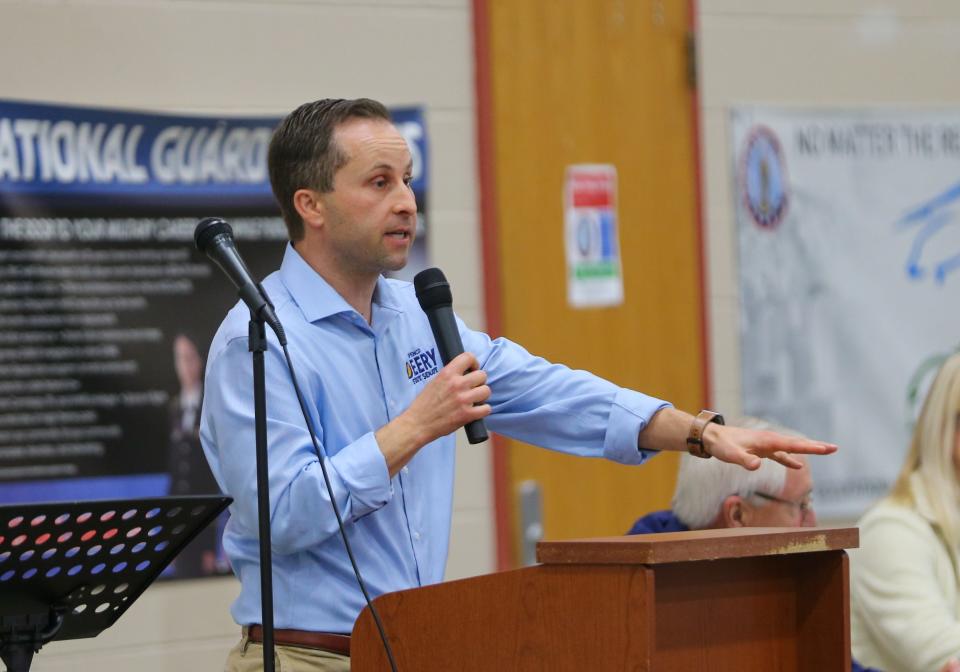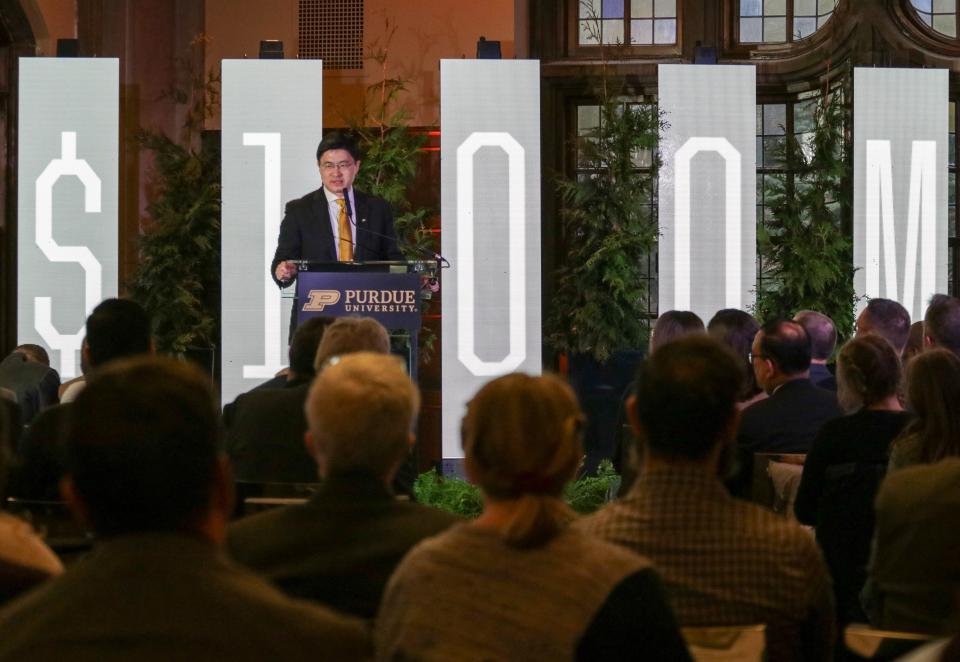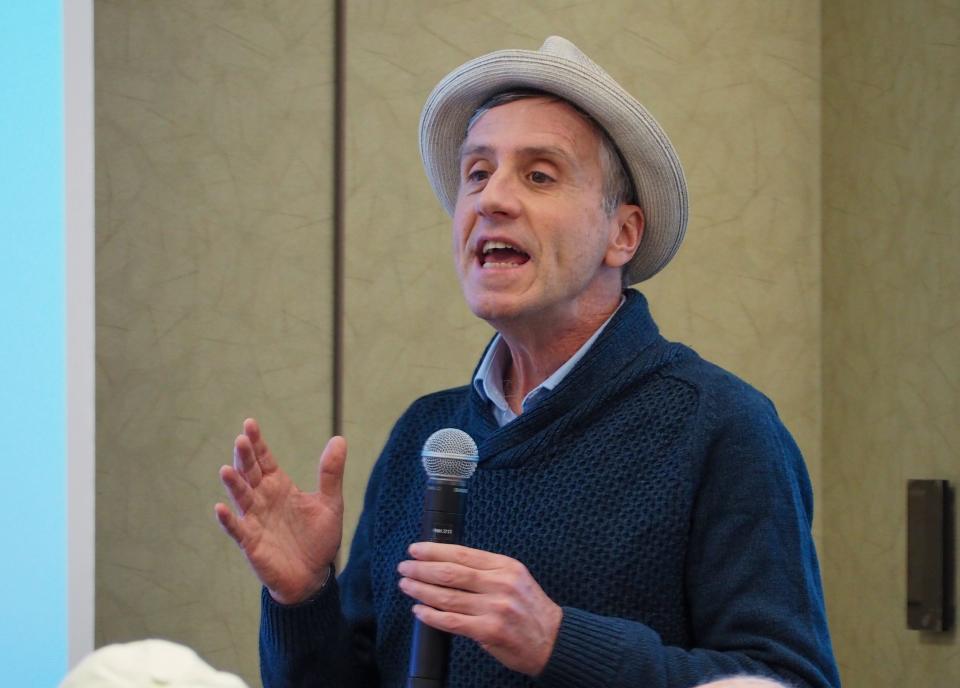‘I feel betrayed’ — Purdue University faculty speaks out against Senate Bill 202
- Oops!Something went wrong.Please try again later.
WEST LAFAYETTE, Ind. — Over the last few weeks, faculty at Purdue University have voiced their opposition to a bill that aims to reform tenure protections at the expense of academic free speech in Indiana.
The legislation intends to have Indiana state universities adopt a philosophy of promoting “intellectual diversity,” which Senate Bill 202 defines as “multiple, divergent and varied scholarly perspectives on an extensive range of public policy issues.”
To ensure that intellectual diversity is being cultivated on campus, the bill gives the universities’ boards of trustees the ability to evaluate faculty members' effectiveness at fostering an environment for “free inquiry, free expression, and intellectual diversity.”

The bill also gives the board of trustees the ability to define what intellectual diversity means at their campus and within individual disciplines. It will give the board the ability to determine whether faculty is eligible for tenure or promotion depending on their performance in promoting intellectual diversity.
Critics of the bill have also expressed their concerns that this bill may limit faculty from performing politically relevant research.
However, the bill does not offer any guidelines on how to determine or gauge whether a faculty member has been meeting the state's arbitrary requirement of promoting intellectual diversity.
This lack of specific language in the bill has led faculty members and other members of university communities across the state to call for the Indiana General Assembly to halt any movement of the bill and reevaluate its purpose.
To the surprise of many in the Purdue University community, the author of the bill was State Sen. Spencer Deery, the representative of West Lafayette’s voice and the former Purdue administrator who ran on the platform of promoting the area’s interest at the statehouse.
His backing of the bill came as a contrast to the message he ran on in 2022.
“I will be a legislator who thinks about the long-term consequences of government action or inaction. I will resist the temptation to embrace ‘quick easy-fixes’ that actually are not. I will be a guardian against unintended consequences and heavy-handed government,” Deery told the Journal & Courier in a 2022 op-ed when he was running for his seat at the statehouse.
Faculty’s concern with SB 202
When asked what inspired Deery to develop this piece of legislation, he explained that last year he noticed a growing movement for “education reform” in other parts of the country and felt like it was his duty to champion this style of legislation in Indiana.
He believed that he was the best state legislator to work on this style of legislation due to his years of experience in higher education as well as his connections to universities across the state.
Over the summer, Deery worked with representatives from universities, faculty and lawyers to develop this piece of legislation.
“There is numerous data that shows that the public’s view on higher education are plummeting, and that’s driven particularly by Republicans in the country who feel like higher education is a monolithic echo chamber that is not welcoming to alternative viewpoints,” Deery said.
When defending his point, Deery referred to a national study conducted by Gallup and a 2018 study by Pew Research Center that discussed the fall in confidence in higher education amongst Republicans.
Deery highlighted this in the House Education Committee on Feb. 14, when he noted that another goal of this legislation was to help make Indiana college campuses more welcoming to conservative students and faculty who may have felt ostracized in higher education.

However, many opponents of the bill expressed their skepticism of Deery’s claim and premise of this bill. Many at Purdue University highlighted the campus’ commitment to the Chicago principles or the idea that intellectual debate may not be suppressed because the ideas put forth are thought by some or even by most members of the University community to be offensive, unwise, immoral or wrong-headed.
“Freedom of inquiry is at the core of the academic enterprise; knowledge advances only when ideas are free to collide and compete,” former Purdue President Mitch Daniels said in 2022 when defining what the Chicago principles meant for Purdue University.
“Free speech and tolerance are equally central to responsible citizenship and self-governance. That’s why we insist on these principles as fundamental in the Purdue experience.”
Alice Pawley, a professor at Purdue University’s School of Engineering Education, expressed her concern that Deery’s sentiment for backing this bill contradicted data showcased by the state of Indiana, which highlighted that 78 percent of students in Indiana felt like they could freely express their opinion. However, that number dropped to 72 percent when it came to students who considered themselves as politically liberal and 55 percent for students who considered themselves as politically conservative.
However, when asked about this data, Deery did not believe this data was relevant to SB 202, noting that the data showcased a holistic perspective of how Indiana students felt about free speech on campus rather than data focusing on a particular group’s perception of free speech.
Pawley also noted that the Foundation for Individual Rights and Expression (FIRE), an organization whose goal is to defend the individual rights of free speech and free thought and who once ranked Purdue University as the third-best school in the nation for freedom of speech, recently released a statement opposing the bill.
“Despite the laudable intention of this section to improve intellectual diversity on Indiana’s public campuses, SB 202 as drafted creates confusion and intrudes too far into the academic freedom rights of faculty,” the statement reads.
“With no strong evidence at all, the house, the senate, the legislator seem willing to adopt a huge change, which even FIRE is not in favor of, but they kept citing FIRE,” Pawly said.
Bryan Duarte, an assistant professor in the College of Education, also expressed his concerns about faculty members who research contemporary issues, which could be perceived as being intrinsically political.
Although the bill does state that the board of trustees may not consider a faculty member’s research when determining if they met the university’s criteria of fostering a culture of intellectual diversity, Durate still shared his worry if it could be used during the review process.
“The language of the bill gives the board of trustees the power to target faculty members that they disagree with. It’s not actually about intellectual diversity, because we are already intellectually diverse. Everything we write goes through peer review and we are very well aware of multiple angles on all issues we write about,” Durate said.
Purdue University Senate’s opposition to SB 202
To emphasize the faculty of Purdue University's concern if SB 202 were to become law, the Purdue University Senate, which is comprised of faculty, students and staff, passed a resolution last week denouncing the bill and calling for Purdue University to make a statement opposing the bill.
“In placing guardianship of intellectual diversity in the hands of the Boards of Trustees SB 202 reposes responsibility for academic freedom in the hands of a body a majority of whose members are politically appointed. This represents a dangerous misallocation of responsibilities away from the faculty — who are in the best position to judge the quality, diversity, and rigor of academic work,“ one portion of the Purdue University Senate’s resolution reads.
When asked for comment, Purdue University’s director of communication, Tim Doty, stated, “As this bill goes through the legislative process, we are working to fully understand its details.”

However, the Journal & Courier asked Purdue University President Mung Chiang if he had any comments to add about the Indiana House’s decision to add the majority committee’s amendments at the Feb. 22 meeting.
Chiang noted that the bill was not perfect but wanted to reassure faculty and students that the university would keep communication channels open with legislators.
“Back on Monday, we said, we are listening to the feedback from faculty, staff, students and alumni, and we are going to optimize across channels of communication, most effectively, to the Indiana General Assembly,” Chiang said.
“And you can see some of the amendments yesterday in the passed version out of the committee are not the same. The version that passed yesterday out of the meeting is not the same as the one that went in. And I'll just say that those effective communication channels are starting to be effective.”
‘I feel betrayed’ — Deery’s constituents share their disapproval
Beyond their concerns about the bill, many in the Purdue University community, from the Purdue University Senate, Purdue Graduate Student Government, faculty and constituents of Deery, have expressed their disappointment and a sense of betrayal in his leadership of this bill.
“What I feel betrayed by is that Senator Deery, on one hand, says he wants to have an environment at Purdue and other places where people can debate different ideas, where the ideas are treated on their merit and not their political underpinnings,” Pawley said.
“But then to hear how he dismissed the (Purdue University) senate vote on Monday, saying that the senate was on the wrong side of civic literacy.
“I’m like, 'You are not trying to engage with the ideas. It’s like you want to dish it, but you can’t take it.' This was his opportunity to engage with the ideas of people who disagree with you, but instead, you spend your time trying to position faculty as ludicrous, privileged idiots — that we are all justified in rolling our eyes at instead of world-class scholars in their fields.”
The Journal & Courier reached out to Deery to ask how he felt about his constituents' disapproval of his actions pushing forward this legislation.
“I am a die-hard fan of all things Purdue, an advocate of Purdue in everything, and that is why I felt like I had a duty to take this bill on, was because it would be good for not just Purdue but for all universities in the state,” Deery said. “It’s good for the people of Indiana as we improve the quantity of students that enroll in higher education and the quality of the education they receive in Indiana.
“I am doing this because it is my duty as the advocate for Purdue to address these issues.”
The Journal & Courier also asked how he felt about academics’ concerns about the vagueness of the bill and the ambiguous interpretations people could have regarding SB 202.
“This is why I had universities that are interpreting the implementation of this, the attorneys that have spent their careers looking at legislative mandates and saying here is what it requires us to do,” Deery said.
“The fact that they are comfortable with this language should speak a lot more clearly than someone who is just picking this up and glancing at this.”
How the bill affects Purdue
Although this bill is still being discussed amongst the Indiana General Assembly, Purdue University has already felt the effects of the state’s decision to discuss this bill.
Last October, the university announced its “Moveable Dream Hires” program, which intended to prioritize the hiring of well-experienced faculty members.
Over the last several months, the university has attempted to court several new hires for the university, but due to Indiana’s "recent infringement" on educational protection, some of these potential hires reconsidered their appointment at Purdue University, according to several faculty members and graduate students who shared this information with the Journal & Courier.

“We’ve heard in the past from people that the political environment in Indiana, and the hostility towards women, minorities, LGBT people, that’s given people pause for their willingness to come to here to Indiana,” David Sanders, a West Lafayette City Councilman and associate professor in the biological sciences department at Purdue University, said.
Sanders also highlighted how he believes this bill intrinsically hurts the future growth of the state as it attacks one of the state’s most attractive resources: its universities.
“The combination of the effects on faculty, the effect on students, it’s just going to damage the reputation of Indiana universities and no one has even countered that argument,” Sanders said. “There will be a deleterious effect on the research enterprise and the quality of faculty at universities in Indiana.”
Ultimately, much of the discourse and arguments regarding the bill are things that Deery expected to encounter, he explained in an interview with The Herald-Times.
Before releasing the bill, Deery explained that he worked with universities across the state to ensure they were either “neutral” or “quietly supportive” of the bill. He also wanted to ensure that there weren’t any potential unintended consequences as a result of the bill.
“To be honest, some of that I expected. Having worked in higher education for a long time, I'm very familiar with the American Association of University Professors and university senates,” Deery told The Herald-Times.
“The University Senate is the voice of certain faculty, and what they are able to do, really the only power they have is to try to get media attention and to create attention on the issue.
“But looking back over the history of recent years, they’ve questioned the tuition freezes at Purdue, they’ve questioned the literacy engagement, they even oppose the Chick-fil-A coming to campus, and these are things that everyone on campus is fine with.
“It is my view that some of this opposition was expected, but as the bill becomes implemented, assuming that it is, ultimately, I think you will look back at that and say, 'Oh, yeah, I remember when there was a big fuss about that but you know, all of the dire predictions will be as forgotten as those others were over the years.'”
Noe Padilla is a reporter for the Journal & Courier. Email him at Npadilla@jconline.com and follow him on X at 1NoePadilla.
This article originally appeared on Lafayette Journal & Courier: Purdue University faculty share their concerns over Senate Bill 202

